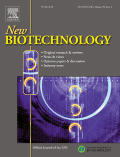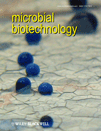
New Biotechnology
Scope & Guideline
Pioneering Tomorrow's Biotechnological Breakthroughs
Introduction
Aims and Scopes
- Biopharmaceutical Innovations:
Research dedicated to the development and optimization of biopharmaceutical processes, including antibody production, vaccine development, and therapeutic protein engineering. - Sustainable Biotechnology:
Exploration of biotechnological applications aimed at sustainability, including bioplastics production, waste valorization, and biofuels. - Microbial and Plant Biotechnology:
Studies focusing on the use of microbial systems and plant-based platforms for the production of valuable compounds, including enzymes, bioactive compounds, and biopolymers. - Genetic Engineering and Synthetic Biology:
Research involving advanced genetic engineering techniques, including CRISPR, synthetic biology applications for metabolic engineering, and gene regulation. - Environmental Biotechnology:
Investigations into bioremediation, microbial ecology, and the role of biotechnology in addressing environmental challenges and promoting ecosystem health. - Advanced Analytical and Bioprocess Technologies:
Development of novel analytical methods and bioprocessing technologies, including microfluidics, bioreactors, and high-throughput screening methodologies.
Trending and Emerging
- Synthetic Biology and Metabolic Engineering:
There is a notable increase in research aimed at engineering microbial and plant systems for the production of high-value compounds, driven by advances in synthetic biology. - Biotechnology in Healthcare:
A surge in studies focusing on biotechnological applications in healthcare, particularly in targeted therapies, novel vaccine development, and personalized medicine. - Circular Economy and Resource Recovery:
Research exploring the integration of biotechnology into circular economy frameworks, emphasizing waste valorization and sustainable resource recovery. - Advanced Genetic Manipulation Techniques:
An uptick in the use of sophisticated genetic tools, such as CRISPR and genome editing strategies, is evident, highlighting the journal's commitment to cutting-edge research. - Microalgae and Biotechnology:
Growing interest in utilizing microalgae for various biotechnological applications, including biofuels, nutraceuticals, and bioremediation, reflects an emerging trend in sustainable practices.
Declining or Waning
- Traditional Fermentation Techniques:
Research focusing solely on conventional fermentation processes is becoming less common, as the field shifts towards more advanced and engineered microbial systems. - Basic Plant Biotechnology:
Studies that primarily cover basic plant biotechnology without a clear application in bioeconomy or sustainability are witnessing reduced attention, as more applied research gains prominence. - Single-Domain Antibody Technologies:
While still relevant, research on single-domain antibodies is being overshadowed by broader immunotherapy approaches and bispecific antibody technologies, which offer enhanced therapeutic potential. - Conventional Waste Treatment Processes:
Research centered on traditional waste treatment methods is declining, as there is a growing emphasis on integrated biotechnological solutions that align with circular economy principles. - Basic Bioinformatics Tools:
While bioinformatics remains crucial, the focus has shifted from basic tools to more complex applications in systems biology and machine learning-driven analyses.
Similar Journals

BIOSYSTEMS ENGINEERING
Empowering scientists to engineer a better biosphere.BIOSYSTEMS ENGINEERING, published by Academic Press Inc. Elsevier Science, is a leading journal that has established itself as a key contributor in the fields of agronomy, crop science, animal science, food science, soil science, and control systems engineering. With an impressive position in the 2023 Category Quartiles, featuring Q1 rankings in Agronomy and Crop Science, Animal Science and Zoology, Food Science, and Soil Science, alongside a Q2 ranking in Control and Systems Engineering, this journal stands at the forefront of innovative research. Currently indexed in Scopus, it boasts a commendable track record, with its Agricultural and Biological Sciences rankings placing it in the 95th percentile for Agronomy and Crop Science and the 90th percentile for Soil Science, among others. With a commitment to disseminating critical advancements and fostering scientific dialogue, BIOSYSTEMS ENGINEERING offers an invaluable platform for researchers, professionals, and students alike, seeking to advance their understanding and application of engineering principles in biological systems. As a hybrid journal that provides both subscription and open access options, it ensures broad accessibility to high-quality research that shapes the future of sustainable agriculture and biological systems.

Microbial Biotechnology
Connecting academia and industry through cutting-edge discoveries.Microbial Biotechnology, published by WILEY, stands at the forefront of innovation in the field of applied microbiology and biotechnology, showcasing cutting-edge research and advancements within both academic and industrial contexts. As an Open Access journal since 2012, it ensures that high-quality research is easily accessible to researchers, professionals, and students globally, promoting knowledge sharing and collaboration. With an impressive impact, the journal holds a Q1 ranking in its categories—Applied Microbiology and Biotechnology, Biochemistry, Bioengineering, and Biotechnology—demonstrating its significance in the scientific community. The journal currently boasts a strong Scopus ranking in several relevant disciplines, including a top 10% position in Applied Microbiology and Biotechnology, highlighting its critical role in disseminating influential findings. Designed to foster dialogue and advance technology within the microbial sciences, Microbial Biotechnology is an essential resource for anyone committed to leveraging microbial processes for sustainable and innovative solutions.

BIOTECHNOLOGY AND BIOPROCESS ENGINEERING
Elevating Knowledge in Biotechnology and BioengineeringBIOTECHNOLOGY AND BIOPROCESS ENGINEERING, published by the Korean Society for Biotechnology and Bioengineering, is a prominent journal in the fields of applied microbiology, biotechnology, bioengineering, and biomedical engineering. Since its inception in 1996, this journal has served as a vital platform for researchers and professionals, facilitating the dissemination of cutting-edge research and innovative applications related to bioprocesses and biotechnology systems. With an ISSN of 1226-8372, this journal is ranked within the Q3 quartile across several categories, demonstrating its relevance and impact in the academic community. Although it operates under traditional access modalities, the journal strives to provide quality and timely insights into the advancements in bioprocess technology and microbial applications, fostering a collaborative environment for knowledge exchange. Notably, it is indexed with a respectable presence on Scopus, making it a valuable resource for students and professionals seeking the latest developments in biotechnology. For more details, kindly refer to the Korean Science Technology Center, #704 Yeoksam-Dong, Gangnam-Ku, Seoul 135-703, South Korea.

CRITICAL REVIEWS IN BIOTECHNOLOGY
Pioneering Thought Leadership in Applied SciencesCRITICAL REVIEWS IN BIOTECHNOLOGY, published by Taylor & Francis Ltd, stands as a leading journal in the field of biotechnology, consistently recognized for its rigorous peer-reviewed articles that impact the disciplines of Applied Microbiology, Biotechnology, and Medicine. With an impressive Q1 ranking in these categories and a significant influence reflected in its Scopus rankings—placing it within the top 5% of Applied Microbiology and the top 4% of Biotechnology journals—the journal serves as an essential resource for researchers, professionals, and students alike. Launched in 1983 and extending its coverage to encompass groundbreaking findings through 2024, it provides a rich forum for insightful reviews and innovative research that propel the field forward. Though not an Open Access journal, CRITICAL REVIEWS IN BIOTECHNOLOGY remains a vital point of reference for ongoing developments, critical analyses, and emerging trends, making it indispensable for those seeking to stay at the forefront of biotechnological advancements.

Microbial Cell Factories
Exploring Sustainable Solutions through Microbial ProcessesMicrobial Cell Factories is a premier peer-reviewed journal dedicated to the field of applied microbiology and biotechnology, published by BMC in the United Kingdom since 2002. With an impressive impact factor, this journal has consistently ranked within the Q1 category across multiple disciplines, including Applied Microbiology, Bioengineering, and Biotechnology, showcasing its significance in the scientific community. The journal’s commitment to open access ensures that innovative research is freely available to researchers, professionals, and students worldwide, fostering collaboration and knowledge dissemination. With a strong presence in Scopus rankings, Microbial Cell Factories is recognized for its contributions to advancing the understanding and application of microbial processes in production systems, making it an essential resource for those involved in the microbiological and biotechnological fields.

MOLECULAR BIOTECHNOLOGY
Transforming Ideas into Molecular SolutionsMOLECULAR BIOTECHNOLOGY, published by SPRINGERNATURE, is a pivotal journal in the fields of applied microbiology, molecular biology, biochemistry, and biotechnology. Since its inception in 1994, the journal has aimed to disseminate high-quality research that explores the intersection of molecular biology and technology, fostering advancements in biotechnology applications. With an ISSN of 1073-6085 and an E-ISSN of 1559-0305, it has established itself as a significant contributor to the scientific community, currently holding a Q3 ranking across multiple categories including Applied Microbiology & Biotechnology and Biochemistry in the 2023 metrics. Although not an open access publication, the journal remains accessible through various institutional subscriptions, providing valuable insights and findings to researchers and professionals. Given its ongoing commitment to quality and relevance, MOLECULAR BIOTECHNOLOGY serves as an essential resource for those involved in cutting-edge research and innovation in molecular biotechnology and related disciplines.

Journal of Genetic Engineering and Biotechnology
Advancing the Frontiers of Genetic InnovationJournal of Genetic Engineering and Biotechnology, published by Elsevier Science Inc, is a prestigious open-access journal that stands at the forefront of research in the fields of biotechnology and genetics. Since its inception in 2011, the journal has provided a platform for cutting-edge studies that explore the complexities and innovations within genetic engineering and its applications in biotechnology. With a commendable Impact Factor and recognized as a Q2 journal in both biotechnology and genetics as per 2023 categorization, it ranks well within Scopus, evidencing its influence in the scientific community. Researchers and professionals accessing articles published in this journal benefit from timely contributions that bridge theoretical and practical aspects of genetic technologies. By fostering a collaborative environment, the Journal of Genetic Engineering and Biotechnology aims to promote advancements that drive science forward, making it an essential resource for students, academics, and industry practitioners alike. For those interested in making their mark in these rapidly evolving fields, this journal offers unparalleled access to high-quality, peer-reviewed research.

BIOPROCESS AND BIOSYSTEMS ENGINEERING
Advancing the Frontiers of Bioengineering and BiotechnologyBIOPROCESS AND BIOSYSTEMS ENGINEERING is a prestigious journal published by Springer, dedicated to advancing the field of bioengineering and biotechnology. Established in 1996, this influential journal provides a platform for disseminating high-quality research that covers a wide spectrum of topics related to bioprocessing, biosystems, and their applications in medicine and environmental engineering. With an impressive impact factor and ranking in the top quartile (Q2) across bioengineering, biotechnology, and miscellaneous medical fields, BIOPROCESS AND BIOSYSTEMS ENGINEERING stands out as a critical resource for researchers, professionals, and students. The journal is indexed in Scopus, reflecting its significant contribution to the scientific community, particularly with its robust percentile rankings (77th in Biotechnology and 70th in Bioengineering). Available in both print and electronic formats, this journal ensures accessible research for those pushing the boundaries of knowledge in bioprocessing and biosystems. As it continues to evolve, BIOPROCESS AND BIOSYSTEMS ENGINEERING encourages submissions that contribute to innovative research practices and applications, thereby fostering academic collaboration and advancement in this dynamic field.

BIOTECHNOLOGY ADVANCES
Unleashing Potential through Biotechnology ResearchBIOTECHNOLOGY ADVANCES is a premier, peer-reviewed journal published by PERGAMON-ELSEVIER SCIENCE LTD, dedicated to advancing knowledge in the rapidly evolving fields of biotechnology and bioengineering. With an ISSN of 0734-9750 and an E-ISSN of 1873-1899, this esteemed journal covers a wide spectrum of topics relevant to applied microbiology, molecular biology, and biochemical innovation. Recognized for its academic rigor, it holds a distinguished position in the top quartile (Q1) in multiple categories, including Applied Microbiology and Biotechnology, Bioengineering, and Biotechnology, further evidenced by its high rankings in Scopus, where it ranks #3/127 in Applied Microbiology and Biotechnology and #7/311 in Biotechnology. Researchers and professionals in the field value the journal not only for its comprehensive coverage of cutting-edge research but also for its commitment to disseminating critical findings and fostering collaboration. While BIOTECHNOLOGY ADVANCES currently operates under a subscription model, its potential impact on future innovations in biotechnology cannot be overstated, making it an essential resource for anyone interested in the forefront of biotechnological advancements.

ELECTRONIC JOURNAL OF BIOTECHNOLOGY
Connecting Discovery with Practical Application in BiotechnologyThe Electronic Journal of Biotechnology is a premier Open Access journal published by Pontificia Universidad Catolica de Valparaiso, Chile, dedicated to advancing the fields of applied microbiology and biotechnology. With its inception in 1998 and an unwavering commitment to sharing knowledge, the journal has garnered a respectable ranking within the Q3 quartile for both its biotechnology and applied microbiology categories as of 2023, reflecting its significance in the academic community. Researchers and professionals will find its editorial rigor complemented by a robust platform for disseminating innovative findings, fostering collaboration, and driving forward biotechnology discussions. Given its inclusive approach, having transitioned to Open Access in 2014, the journal ensures that research is accessible to a global audience, making it a valuable resource for students, academics, and industry practitioners alike. Through the publication of original research, reviews, and critical insights, the Electronic Journal of Biotechnology aims to bridge the gap between scientific discovery and practical application, ultimately contributing to advancements in health, agriculture, and environmental sustainability.